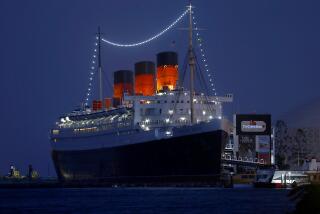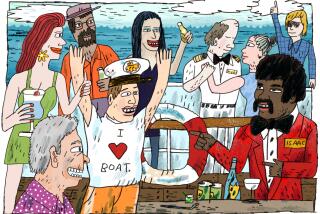CRUISE ISSUE: FALL / WINTER : Into the Beckoning Arms of Paying Port Merchants : Shopping: Buyers beware. Some Caribbean shop owners pay cruise lines to recommend their stores to passengers going ashore.
- Share via
If you take a Caribbean cruise, you’ll probably get some advice from shipboard personnel just before disembarkation on which local shops to try. But before you start spending, think a suspicious thought: Why are the cruise people sending me to this shop and not another one?
The answer is that many major cruise lines in the Caribbean make direct or indirect deals that require port merchants to pay promotional fees (some would say kickbacks) or other payments in exchange for shipboard preferential treatment. At least one line, Carnival, acknowledges that it cuts such deals and volunteers no information about them to passengers.
Many other lines hire consultants to conduct these programs, acknowledging merchants’ payments in printed materials or lectures. A minority of other lines say their employees are forbidden from making arrangements with merchants, in part because passengers could find the practice deceptive.
In fact, Sen. Celestino A. White Sr., a member of the U.S. Virgin Islands’ territorial legislature, recently drafted a bill to restrict these practices and require cruise lines to make full disclosure of any such agreements to passengers. But in August, after strong opposition from the Florida Caribbean Cruise Assn., the bill was withdrawn. Meanwhile, many travelers don’t realize that they are pawns in these deals.
Over the last 10 to 15 years, cruise veterans say, Caribbean “on-board promotions” has evolved into a mini-industry. Three competing promotions companies provide on-board publications to cruise ships, sell space in the publications to port merchants (jewelers, T-shirt shops and the like) and send “shore lecturers” aboard ships to deliver briefings to passengers just before they disembark. To get mentioned in print or aloud, merchants pay.
Though promoters’ on-board publications often include a sentence acknowledging that merchants have paid for inclusion, many passengers take the advice without recognizing: A) that the lecturer isn’t a cruise line employee, and B) that the praise that the lecturer doles out is less advice than it is advertising.
The leading companies in the field, all based in Miami, include International Voyager Media of Miami (which has contracts with Holland America and Princess cruise lines), On-Board Media of Miami (Royal Caribbean, Celebrity, Costa and Crystal) and Panoff Publishing (Premier, Dolphin, Majesty and Regency cruise lines).
Carnival Cruise Lines, with 10 ships, runs its own promotions program. But Carnival doesn’t volunteer any information to passengers about the fees merchants have paid in exchange for mentions in print and lectures. “To my knowledge, we’re not doing that right now,” said Carnival spokeswoman Jennifer de la Cruz. “If somebody asks one of our cruise staff, then the cruise staff would acknowledge it.”
Though similar programs have been attempted in Mexican ports, industry veterans say the promotional deals are generally confined to the Caribbean, where retail stakes are high. The Florida Caribbean Cruise Assn. reports that cruise ships last year delivered 1.24 million passengers to the U.S. Virgin Islands’ St. Thomas, the Caribbean’s busiest port. Caribbean cruise passengers, according to a study commissioned by the association last year, spent an average of $394 per person on shore.
Though these deals may surprise many travelers, “The situation that existed before was much sleazier. This used to be like the Wild West,” said Lawrence Fishkin, president of the Cruise Line, a Miami-based travel agency that specializes in cruises. “What used to happen years ago is that the tour directors on a major line would earn a quarter of a million dollars a year in royalties” from port merchants.
In many ways, many say, the emergence of third-party companies to formalize promotional and advertising agreements has served to legitimize the trade. If a dispute arises over merchandise, they say, passengers can benefit from the cruise lines’ clout, and their determination to hold onto customers in a highly competitive trade.
At International Voyager Media, Chief Operating Officer John Serafine said that since 1991 the company has published its island shopping maps with a notation that the recommended stores have paid a promotional fee. One recent Princess ship publication shows a note that begins with the assertion that “each merchant listed on this map has been carefully selected on the basis of quality, fair dealing and value.” The following sentence notes that the chosen stores have also “paid a promotional fee for inclusion as a guaranteed store.”
Serafine said some merchants pay promotional fees based on the number of ships that call at the port; others are more specifically based on the number or dollar value of transactions a merchant conducts.
Fees vary widely, Serafine said, and would run $500 to $700 per shore call for a large, upscale retail operation serving passengers from large, upscale ships. Serafine noted that he has two employees whose time is dedicated to mediating passengers’ claims, and that the firm has dropped a handful of merchants whom it considered unsatisfactory.
Meanwhile, some other lines such as Seabourn and Windstar say they make no deals involving merchant fees and no recommendations of specific retailers.
Reynolds travels anonymously at the newspaper’s expense, accepting no special discounts or subsidized trips. To reach him, write Travel Insider, Los Angeles Times, Times Mirror Square, Los Angeles 90053.
More to Read
Sign up for The Wild
We’ll help you find the best places to hike, bike and run, as well as the perfect silent spots for meditation and yoga.
You may occasionally receive promotional content from the Los Angeles Times.







